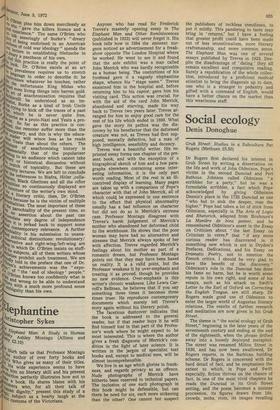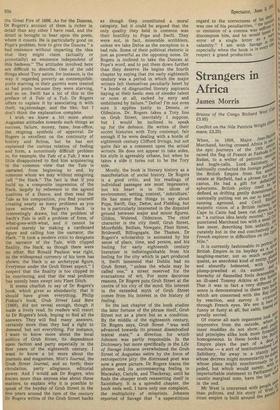Social ecology
Denis Donoghue
Grub Street: Studies in a Subculture Pat
Rogers (Methuen £5,50)
Dr Rogers first declared his interest in Grub Street by writing a dissertation on the life and work of John Oldmixon, Pope's victim in the second Dunciad and Peni Bat hous. Johnson called Oldmixon "a scribbler for a party," but he was a formidable scribbler, a fact which Pope acknowledged by giving Oldmixon Dennis's place in the 1735 Dunciad as one "who but to sink the deeper, rose the higher." Pope had taken a lot of stick from Oldmixon, especially in The Arts of Logic and Rhetorich, adapted from Bouhours's La Maniere de bien penser, and he remembered Oldmixon's sneer in the Essay on Criticism about "the last Essay on Criticism in verse,' that "if any more curious reader has discovered in it something new which is not in Dryden's Prefaces, Dedications, and his Essay on Dramatic Poetry, not to mention the French critics, I should be very glad to have the benefit of the discovery." Oldmixon's role in the Dunciad has done his fame no harm, but he is worth some repute in his own right, and some of his essays, such as his attack on Swift's Letter to the Earl of Oxford on Correcting the English Tongue, are still sharp. Dr Rogers made good use of Oldmixon to enter the larger world of Augustan literary relations. The results of further research and meditation are now given in his Grub Street.
The theme is "the social ecology of Grub Street," beginning in the later years of the seventeenth century and ending at the end of the eighteenth, when the phrase drifted away into a loosely deployed metaphor. The street was renamed Milton Street in 1830, and has now been swallowed, Dr Rogers reports, in the Barbican building scheme. Dr Rogers is concerned with the hard detail of fact, and he emphasises the extent to which, in Pope and Swift especially, fiction thrives on the chance of fact. In one of the most vivid chapters he reads the Dunciad in its Grub Street setting, and the poem becomes a sinister procession, its figures drawn from life, crowds, mobs, riots, its images recalling the Great Fire of 1666. As for the Dunces, Dr Rogers's account of them is richer in detail than any other I have read, and the detail is brought to bear upon the poem, where it counts. He is particularly good on Pope's problem, how to give the Dunces a bad eminence without imparting the idea that they might claim (actually or potentially) an eminence independent of this badness." The attitudes involved here are difficult to describe. One of the odd things about Tory satire, for instance, is the way it regarded, poverty as contemptible: poets starving in their garrets were treated as bad poets because they were starving, and so on. Swift has a lot of this in the preface of A Tale of a Tub. Dr Rogers offers to explain it by associating it with theft, va,abondage, and the like, but I don't think the explanation complete.
I wish we knew a bit more about Augustan attitudes towards such things as success, failure, money, fame, box-office, the reigning symbols of approval. Dr Rogers is excellent on the continuity of history and fiction, but he has not explained the curious relation of feeling and form, a notoriously difficult problem in, for example, the Tale of a Tub. I was a little disappointed to find him acquiescing in the common view that the Tale is narrated, from beginning to end, by someone whom we may without misgiving call "the Hack." The fact is that if you build up a composite impression of the Hack, largely by reference to the agreed qualities of a Dunce, and then read the Tale as his composition, you find yourself creating nearly as many problems as you have solved. Dr Rogers's Hack is interestingly drawn, but the problem of Swift's Tale is still a problem of form, of what-goes-with-what, and it cannot be solved merely be making a cardboard figure and calling him the narrator, the Hack. "It took a modern critic to designate the narrator of the Tale, with clipped finality, the Hack, as though there were no other. But Ronald Paulson was right, as the widespread currency of his term has shown; the Hack is an archetypal figure, Everyman under the Grub Street aspect." I suspect that the finality is too clipped to be convincing, and that the real problem has merely been swept into Fleet Ditch.
It seems churlish to say of Dr Rogers's book, which gives so abundantly, that it should have given everything. Philip Pinkus's book, Grub Street Laid Bare (1968), did not reveal enough, though it made a lively read. So readers will resort to Dr Rogers's book, hoping to find all the answers. They will find many answers, certainly more than they had a right to demand, but not everything. For instance, I want to know more about the local politics of Grub Street, its dependence upon faction and party especially in the first years of the eighteenth century. I want to know a lot more about the journals and magazines, Mist's Journal, the Grub Street Journal, and so forth; their circulation, party allegiance, editorial power. And I would ask Dr Rogers, who knows more than anyone else about these matters, to explain why it is possible to speak of the heyday of Grub Street in the few years around the turn of the century Dr Rogers writes of the Grub Street hacks as though they constituted a moral category, but it could be argued that the only quality they held in . common was their hostility to Pope and Swift. They were not, in fact, miserable scribblers, unless we take Defoe as the exception to a bad rule. Some of their political rhetoric is just as powerful as the opposing noise. Dr Rogers is inclined to take the Dunces at Pope's word, and to put them down further than they deserve. He begins the fourth chapter by saying that the early eighteenth century was a period in which the major writers felt themselves peculiarly beset by "a horde of disgruntled literary aspirants baying at their heels: men of slender talent or none at all, racked by envy and embittered by failure.' Defoe? I'm not even sure it applies justly to Dennis or Oldmixon. Dr. Rogers takes a Tory line on Grub Street, inevitably I suppose, but I would be inclined to speak up for the defence. He writes of their secret histories with Tory contempt; fair enough if he were dealing with a horde of eighteenth century Clifford Irvings, but not quite fair as a comment upon the actual writers. He does not appear to take sides, his style is agreeably urbane, but when he takes a side it turns out to be the Tory side.
Mostly, the book is literary history as a manifestation of social history. Dr Rogers is a good critic, and his readings of individual passages are most impressive, but his heart is in the idiom of environment, setting, context, 'subculture.' He has many fine things to say about Pope, Swift, Gay, Defoe, and Fielding, but he is particularly interested in the disputed ground between major and minor figures, Gildon, Welsted, Oldmixon. The chief character is the city itself, Grub Street, Moorfields, Bedlam, Newgate, Fleet Street, Bridewell, Billingsgate, the Thames. Dr Rogers's scholarship is animated by his sense of place, time, and person, and his feeling for early eighteenth century literature is indistinguishable from his feeling for the city which in part produced it. Swift lamented that Dublin had no Grub Street, "unless the whole may be called one," a street reserved for the evacuations of wit. For more decorous reasons, Dr Rogers puts Grub Street at the centre of his city of the mind. His interest in the extended myth of Grub Street comes from his interest in the history of feeling.
So the last chapter of the book studies the later fortune of the phrase itself, Grub Street not as a place but as a condition. By the middle of the eighteenth century, Dr Rogers says, Grub Street "was well advanced towards its present disembodied lexical state," a direction for which Johnson was partly responsible. In the Dictionary but more specifically in the Life of Savage Johnson overwhelmed the Grub Street of Augustan satire by the force of retrospective pity: the distressed poet was now a genre picture. Dr Rogers traces the phrase and its accompanying feeling in Macaulay, Carlyle, and Thackeray, until he finds the sharper truth reasserting itself in Saintsbury. It is a splendid chapter, the book ends well. I have only one complaint, the multiplicity of misprints. Johnson reported of Savage that "a superstitious Spectator, June 3, 1911 beets" regard to the correctness of hisioo was one of his peculiarities " the in!.:,-,ste or omission of a comma Was suf;at discompose him, and he would laraen'avy error of a single letter as a /1st, calamity." I am with Savage je especially when the book is in evel respect a grand production.













































 Previous page
Previous page